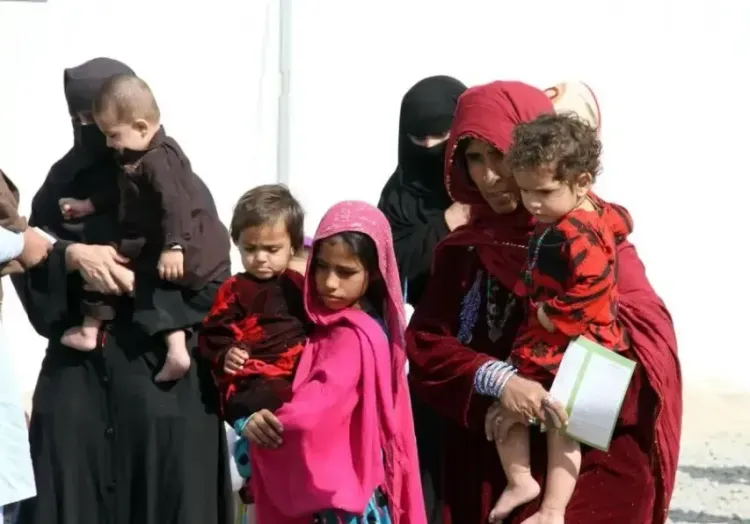Pakistan Intensifies Deportation of Afghan Refugees, Expelling 2,239 More

Synopsis
Key Takeaways
- Over 2,239 Afghan refugees deported from Pakistan.
- Mass repatriation continues after March deadline.
- Many deportees lacked documentation and basic necessities.
- Reports of police extortion and harsh treatment during deportation.
- International calls for humane repatriation practices.
Islamabad, April 18 (NationPress) More than 2,239 Afghan individuals were expelled through the Torkham border as Pakistan heightened its ongoing crackdown on Afghan refugees.
The mass repatriation on Thursday followed the conclusion of the March 31 deadline, according to local media.
“The expelled individuals were residing in various districts of Punjab and Khyber-Pakhtunkhwa. Among those who arrived at the transit camp, 894 individuals were living without documentation, while 636 held ACC cards, and 709 Afghans were directly transferred to the Torkham border from different districts in Punjab and Pakistan-Occupied Kashmir,” stated Khyber Deputy Commissioner Bilal Shahid in a conversation with The Express Tribune.
On the previous day, Afghan Minister of Industry and Commerce, Nooruddin Azizi, led a significant delegation to Pakistan.
In a statement issued on Thursday, the Minister emphasized the necessity of bilateral discussions to devise effective resolutions concerning the deportation of Afghan refugees.
He advocated for their voluntary repatriation in accordance with standards set by the United Nations High Commissioner for Refugees (UNHCR), ensuring that the process is both safe and dignified, as reported by the Afghan state-run Bakhtar News Agency.
With the increasing exodus of returning Afghan migrants from Pakistan, numerous deportees crossing through the Torkham border recently expressed that they not only lack homes but also have no land to build one.
“We request that job opportunities be generated for us. We are without homes and land. All our belongings are left behind. There are no jobs available, and no one has provided employment for us. Our most pressing need is shelter,” reported TOLO News, citing Mohammad Nabi, a deported migrant from Pakistan.
Many deported Afghan migrants have also reported that Pakistani police treated them harshly, extorted money under various pretexts during their journey, and exhibited aggressive behavior. The forcibly deported Afghan refugees indicated that Pakistani drivers exploited their vulnerable situation, charging exorbitant fares for transportation.
“The first time I was detained, they took 20,000 rupees from me. Three days after releasing me, I returned home, but when I went shopping, they arrested me again and took another 20,000 rupees,” Afghan media quoted Mohammad Eshan, a deportee from Pakistan.
Furthermore, Dad Mohammad, a 58-year-old resident of Kunar province, who had migrated to Pakistan 45 years ago, stated that despite decades of living and working there, he and his family were abruptly deported empty-handed, contravening migration principles.
“The Pakistani police raided my home, treated me brutally, and didn’t afford me the opportunity to collect my belongings. Our motorcycles, cargo vehicle, and all our possessions were abandoned. We barely had time to load the children into the vehicle and escape,” he recounted.
Meanwhile, the International Organization for Migration (IOM) reported a significant spike in forced returns between April 1 and 13, with nearly 60,000 individuals crossing back into Afghanistan via the Torkham and Spin Boldak border points.
The IOM and its partners reiterated their appeal for an immediate cessation of forced returns of Afghans until conditions are established to guarantee safe, dignified, and voluntary returns, irrespective of a person's legal status.









